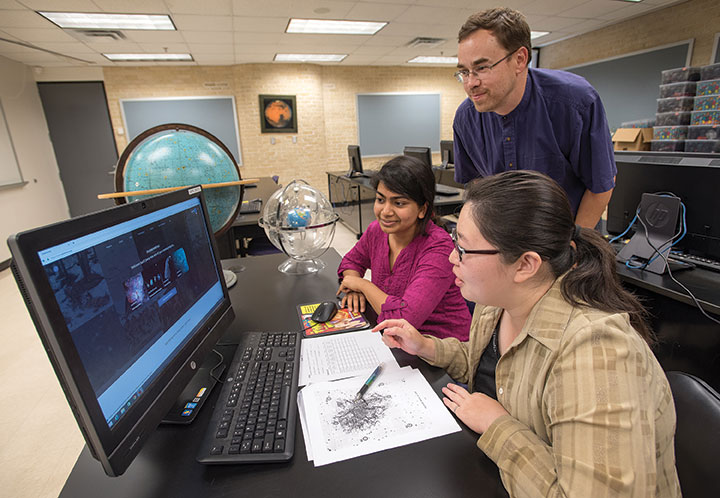Understanding Cosmic Origins
A course on the history of the universe.

Students work with the Zooniverse website to assist scientific researchers.
Understanding Cosmic Origins
A course on the history of the universe.
Students in Physics 10263: Cosmic Origins are working through the website zooniverse.org to assist professional scientists with a variety of tasks, from classifying different types of galaxies to searching for unique particles and comets to identifying new stars.
Cosmic Origins is a lower division science course offered by the Department of Physics and Astronomy that was introduced to TCU in spring of 2015. The class satisfies both the “Natural Science” and “Historical Traditions” core requirements.
“Cosmic Origins is basically the history of the history of the universe,” said Peter Frinchaboy, instructor for the lecture component of the class. “So it covers our current understanding of the universe, but also how that came to be, and how that had an effect on greater society as well.”
The course is structured chronologically as students are taken through some of the most significant events throughout the ages that have helped define our current conception of the universe. They begin with some of the earliest understandings and move from the rejection of the geocentric model of the universe (the idea that Earth was at the center of everything), to the discovery of gravity, the Great Debate in the early 1900s and many more until arriving at our current understanding.
But even that current understanding is not set in stone, as Frinchaboy points out.
“Everything was sort of clockwork in Newton’s time, everything could be easily explained,” said Frinchaboy. “But now as we work toward our modern understanding, new things are being discovered all the time … In just this last year we’ve had to update the curriculum because of new discoveries.”
In addition to the lecture portion of the course, students are also required to take a lab component. In it students learn to measure and identify properties of stars and galaxies, and additionally use this information to assist scientific research across the country. The class is also given the opportunity to use the planetarium at the Fort Worth Museum of Science and History.

Your comments are welcome
Comments
Related reading:
Features
Discovering Global Citizenship, or How to Help a Vanishing Species
TCU’s award-winning international education program is making an impact on South Africa’s endangered rhinos.
Campus News: Alma Matters
Yoga for Musicians
Music majors learn to improve focus, build strength and relax.